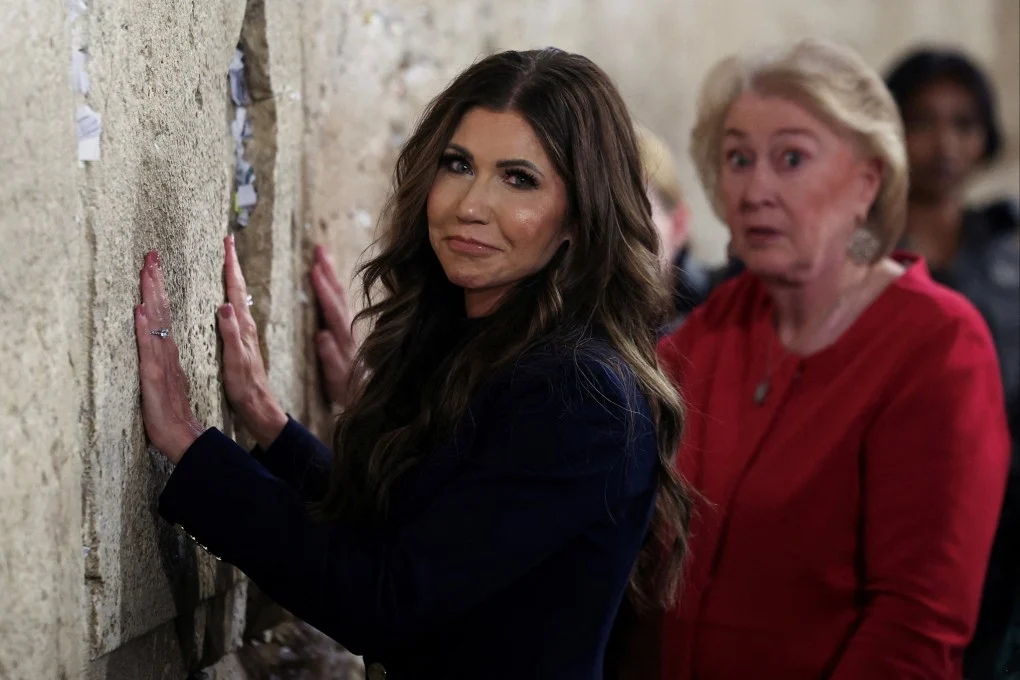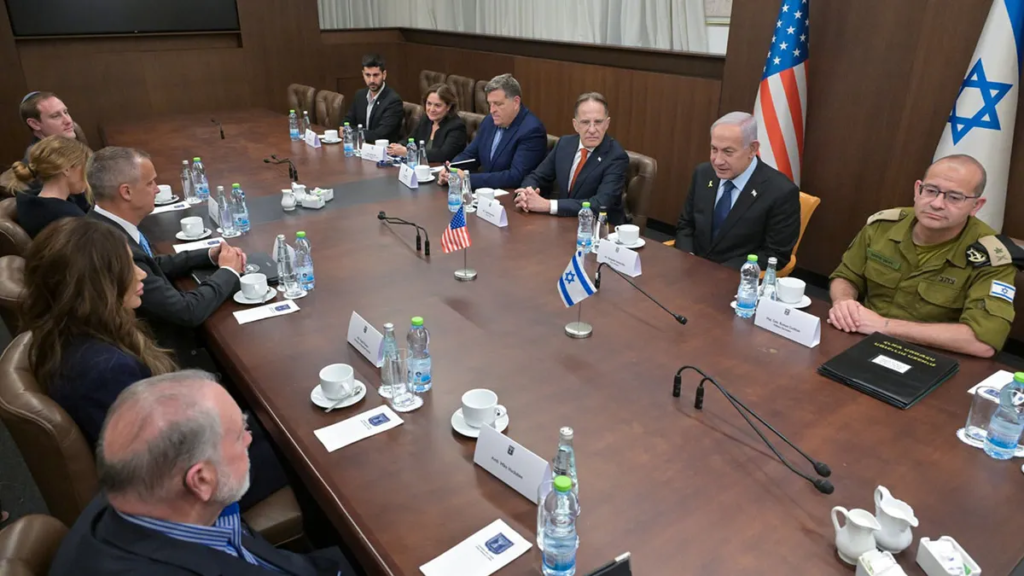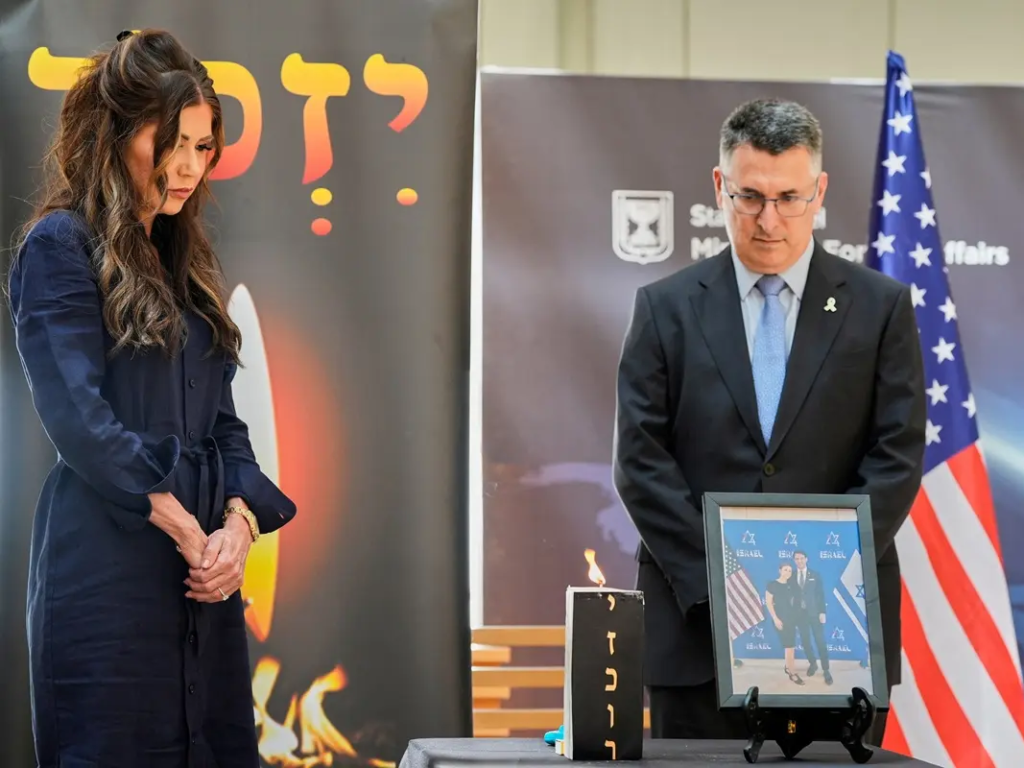In a significant diplomatic move, U.S. Homeland Security Secretary Kristi Noem traveled to Israel on May 25, 2025, to meet with Israeli Prime Minister Benjamin Netanyahu in Jerusalem. The visit, prompted by President Donald Trump following a tragic shooting outside the Capital Jewish Museum in Washington, D.C., underscored the United States’ steadfast support for Israel amid escalating tensions in the Gaza Strip. Noem’s trip, which also included stops in Bahrain and participation in Jerusalem Day celebrations, highlighted the complex dynamics of U.S.-Israel relations, particularly concerning Israel’s ongoing military strategy in Gaza.
Context of the Visit
The visit came in the wake of a deadly attack that claimed the lives of two Israeli Embassy staff members, Yaron Lishinsky and Sarah Milgrom, in Washington, D.C. on May 21, 2025. The shooting, described by Israeli authorities as an antisemitic act, prompted President Trump to dispatch Noem to Israel to strengthen diplomatic ties and reaffirm U.S. commitment to its ally. According to reports from The New York Times, Noem’s meetings with Israeli officials, including Netanyahu and Foreign Minister Gideon Saar, aimed to address both the recent tragedy and broader regional concerns, including the ongoing conflict in Gaza.

Noem’s trip also followed a period of strained relations between President Trump and Netanyahu, primarily due to disagreements over Israel’s military escalation in Gaza and negotiations with Iran. Despite these tensions, Noem’s visit was a clear signal of continued U.S. support for Israel’s security policies, particularly its approach to the Gaza conflict.
Meetings with Israeli Leadership
On May 25, Noem arrived in Israel and was welcomed by U.S. Ambassador to Israel Mike Huckabee. She visited the Western Wall in Jerusalem’s Old City, a significant gesture of solidarity, before meeting with Netanyahu. According to a statement from the Prime Minister’s Office, Noem expressed “unwavering support” for Netanyahu and Israel, praising his policies, including the construction of a border fence along the Egypt-Gaza border and his management of the war against Hamas.
The discussions also touched on U.S.-Israel cooperation in addressing security challenges. Noem met with Israeli National Security Minister Itamar Ben-Gvir, who thanked her for U.S. support and President Trump’s immigration policies, which some Israeli officials see as aligning with Israel’s security priorities. The meetings underscored a shared commitment to countering threats from Hamas and other regional actors, including Iran, which has been a point of contention in U.S.-Israel relations.
Noem’s participation in a memorial ceremony for the slain embassy staffers further highlighted the emotional weight of her visit. The ceremony, attended by Foreign Minister Gideon Saar and U.S. Ambassador Huckabee, honored the lives of Lishinsky and Milgrom, whose deaths were condemned by Netanyahu as a result of “antisemitic” violence. Noem’s presence at the event reinforced the U.S.’s condemnation of the attack and its solidarity with Israel during a time of mourning.
U.S. Support for Israel’s Gaza Strategy
The Gaza conflict has been a focal point of U.S.-Israel relations, particularly since Israel resumed its military offensive in March 2025 after a brief ceasefire collapsed. Netanyahu’s government has pursued a strategy aimed at dismantling Hamas, which it accuses of seizing humanitarian aid and perpetuating violence. This approach includes a controversial plan to “capture” Gaza, involving the relocation of much of the territory’s 2.1 million residents to the south and strict control over aid distribution. According to Reuters, Israel’s security cabinet approved this plan, which has drawn international criticism for its potential humanitarian impact.

Noem’s visit signaled U.S. endorsement of Israel’s efforts to neutralize Hamas, despite global concerns about the humanitarian crisis in Gaza. The Gaza Health Ministry reported that over 3,785 Palestinians have been killed since the offensive resumed, with recent strikes killing at least 38 people, including children, in a 24-hour period. Israel’s blockade, which restricted aid for 11 weeks, has exacerbated food and medical shortages, prompting warnings of famine from aid organizations.
During her meeting with Netanyahu, Noem expressed appreciation for his handling of the conflict, including the border fence initiative, which aims to prevent Hamas from smuggling weapons and fighters across the Egypt-Gaza border. This stance aligns with President Trump’s earlier support for Israel’s military actions, including lifting restrictions on sending large bombs to Israel to “finish the job” against Hamas. However, Trump has also voiced frustration with the prolonged conflict, emphasizing the need to rebuild Gaza and secure the release of the remaining 58 hostages held by Hamas since the October 7, 2023, attack.
Broader Diplomatic Context
Noem’s visit to Israel was part of a broader Middle East tour that included a stop in Bahrain, where she met with King Hamad bin Isa Al Khalifa and visited a U.S. naval base. The Bahrain leg of the trip highlighted the U.S.’s efforts to maintain strong ties with its Arab allies, even as it navigates tensions with Israel over Gaza and Iran. Reports from The Indian Express indicate that Noem discussed U.S. negotiations with Iran during her meeting with Netanyahu, describing the conversation as “candid.” These talks, which recently concluded a fifth round in Rome, are a point of concern for Israel, which fears a potential U.S.-Iran deal could undermine its security.
The visit also comes at a time when international pressure on Israel is mounting. The United Kingdom, European Union, and Australia have criticized Israel’s Gaza offensive, with the UK pausing trade talks and the EU reviewing its relationship agreement with Israel. British Foreign Secretary David Lammy described the conflict as entering a “dark new phase,” citing the blockade’s impact on Gaza’s civilian population. Despite this, Noem’s reaffirmation of U.S. support underscores the divergence between U.S. policy and that of other Western allies.
Implications for U.S.-Israel Relations
Noem’s trip highlights the complex interplay between U.S. domestic politics and its foreign policy in the Middle East. The Biden administration had faced criticism for its handling of the Gaza conflict, and the Trump administration’s approach appears to prioritize unwavering support for Israel while balancing relations with Arab partners. Noem’s presence in Israel, coupled with her participation in Jerusalem Day—the first time a U.S. cabinet secretary has attended the event—signals a deepening of symbolic and practical ties between the two nations.
However, tensions remain. Trump’s frustration with Netanyahu’s refusal to scale back the Gaza offensive, coupled with concerns over a potential Iran deal, suggests that U.S.-Israel relations are not without friction. The New York Times reported that Trump views the prolonged Gaza conflict as a barrier to his vision for rebuilding the territory, a plan that includes displacing Gaza’s residents—an idea that has sparked international condemnation.

Looking Ahead
As Noem returned to the U.S., her visit left a clear message: the United States remains a steadfast ally of Israel, even as the Gaza conflict fuels global debate. The reaffirmation of support for Netanyahu’s policies, including the controversial Gaza strategy, reflects the Trump administration’s prioritization of Israel’s security over international calls for a ceasefire. However, the humanitarian crisis in Gaza and the delicate balance of U.S. relations with both Israel and its Arab allies will continue to shape the region’s future.
For now, Noem’s trip has strengthened the U.S.-Israel partnership at a critical juncture. As the Gaza conflict evolves and negotiations with Hamas and Iran progress, the world will be watching how the U.S. navigates its role in one of the most volatile regions on the globe.
Must Read :- U.S. Delays 50% EU Tariffs Until July 9 After Trump-Von der Leyen Call





